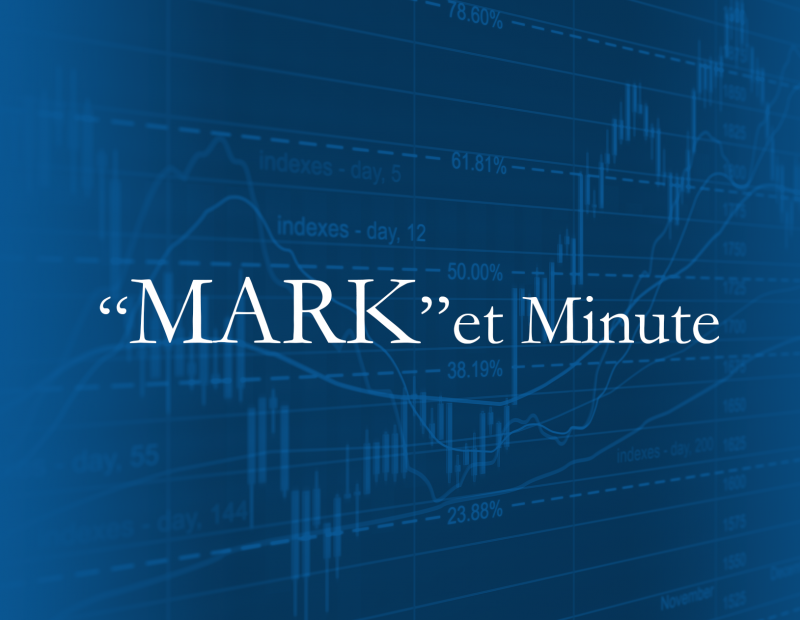Investment Commentary –September 14th, 2016
Market Indices as of Market Close September 14th, 2016
Dow 18,034 (3.50% YTD)
S&P 2,125 (4.00% YTD)
NASDAQ 5,173 (3.32% YTD)
Global DOW 2,405 (2,033 week low/high 2,489)
10-year Treasury 1.54 (1.32 52 week low /2.38 high)
Gold 1,325 ($1,053 52 week low /high $1,384)
Oil $43.63 ($33.28 52 week low /high $54.34)
Dow, S&P 500 end lower as oil drops; Nasdaq bucks trend
The Dow industrials and the S&P 500 closed in negative territory Wednesday in the wake of slumping crude-oil prices, erasing earlier gains for the major benchmarks, while the tech-heavy Nasdaq bucked the losing trend.
The Dow Jones Industrial Average DJIA, -0.18% slid 31.98 points, or 0.2%, to close at 18,034.77 even as Apple AAPL, +3.54% climbed 3.6% as analysts at RBC Capital Markets outlined five reasons the tech giant is still a buy.
However, the tech giant’s gains were overshadowed by big declines in International Business Machines Corp. IBM, -1.13% and Boeing Co. BA, -0.85%
The S&P 500 index SPX, -0.06% fell 1.25 points to end at 2,125.77, weighed by a 1.2% drop in the energy sector.
The Nasdaq Composite Index COMP, +0.36% advanced 18.52 points, or 0.4%, to close at 5,173.77.
A rebound in Treasury prices had earlier buoyed the market, according to Mark Kepner, managing director of sales and trading at Themis Trading. “The stable bond market gave investors some comfort, encouraging them to buy some of the dip,” he said.
JP Morgan Thought of the week
Over the past several months, 3-month Libor has steadily increased by over 20 bps in a move directly related to new regulation from the SEC that goes into effect next month.
The new reform will materially change institutional prime money market fund operations. In short, these funds will now have to float their net asset value (NAV) and are also capable of imposing a fee on redemptions should the board determine that such a fee would be in the best interest of the fund.
In contrast, government money market funds will not be subject to these stipulations, leading to large flows out of institutional and into government money market funds. As a result of these redemptions, institutional funds have been buying shorter dated notes to maintain liquidity, effectively withdrawing the largest source of demand for 3-month paper and causing 3-month Libor to float upwards.
Looking forward, prime funds will likely continue to see redemptions even after the regulation is implemented, meaning that 3-month Libor may remain elevated for longer despite other shorter dated rates, such as the Federal funds rate, remaining anchored. Because this increase is not indicative of a broad credit quality issue, the move could present an attractive entry point for investors, especially in floating rate notes from higher quality issuers.
i-Phone optimism blasts Apple stock to 2016 high
Apple’s (AAPL.O) stock hit a 2016 high on Wednesday, with its market value peaking above $600 billion for the first time since April as Wall Street bet the technology company’s newest iPhone would help shore up falling sales.
Fueled by U.S. wireless carriers’ reports of strong early orders for the iPhone 7 as well as arch-rival Samsung Electronics’ (005930.KS) widely-publicized recall of potentially exploding Galaxy Note 7 smartphones, shares of Apple rose as much as 4.7 percent to $113.03 for a gain of 10 percent in the past three days.
Its market capitalization reached nearly $607 billion, compared to $535 billion for Alphabet (GOOGL.O) and $440 billion for Microsoft (MSFT.O).
The Lightning connection on the Apple iPhone 7 is shown on display during an Apple media event in San Francisco, California, U.S. September 7, 2016. REUTERS/Beck Diefenbach
After sinking to a two-year low in July that had portfolio managers describing Apple as a value stock and no longer a growth play, shares of the world’s most valuable listed company have since rebounded 25 percent.
On Tuesday, Sprint (S.N) said pre-orders for the iPhone 7 were up nearly four times compared to last year’s iPhone. T-Mobile (TMUS.O) said pre-orders rose nearly four times compared with its next most popular iPhone.
Potentially adding to demand for Apple’s products, China’s quality watchdog said on Wednesday that Samsung would recall 1,858 of its Galaxy Note 7 phones due to its fire-prone batteries, expanding the list of countries where the devices have been recalled.
THIS DAY IN FINANCIAL HISTORY: September 14, 1966
How Does $1.40 Sound?
On this day in 1966 the senate adopted legislation to raise the country’s minimum wage to $1.40.
The views presented are not intended to be relied on as a forecast, research or investment advice and are the opinions of the sources cited and are subject to change based on subsequent developments. They are not a recommendation, offer or solicitation to buy or sell any securities or to adopt any investments.
http://www.marketwatch.com/story/dow-industrials-sp-500-close-lower-as-oil-prices-fall-2016-09-14
http://www.reuters.com/article/us-markets-apple-idUSKCN11K2CS?feedType=RSS&feedName=businessNews
http://www.econedlink.org/economic-calendar.php?month=9


Leave A Comment